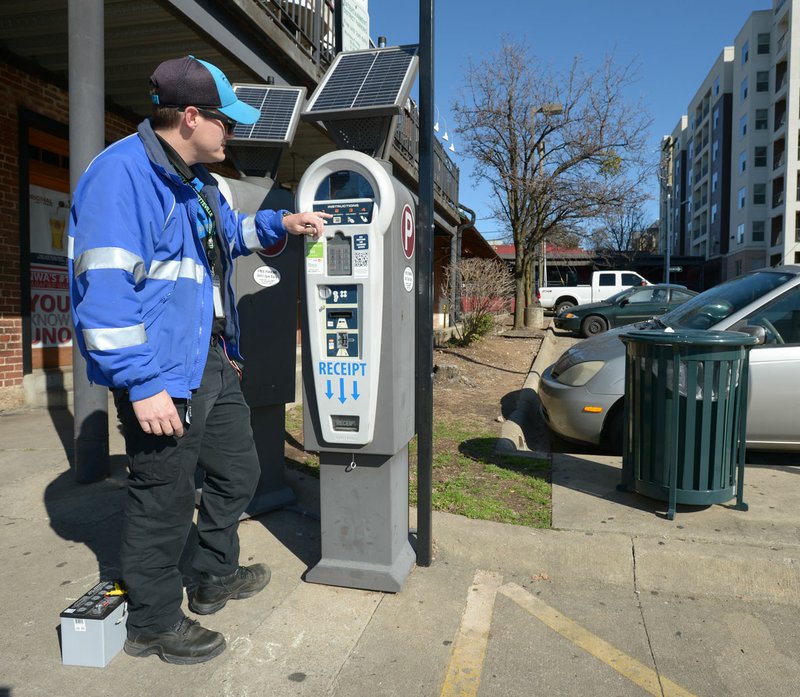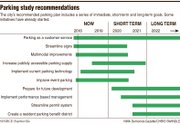FAYETTEVILLE -- Drivers can expect a few changes soon when parking downtown while city officials mull a larger plan to make the experience more intuitive.
The City Council on Tuesday is set to decide whether to adopt the first phase of a comprehensive master plan addressing parking on and near the Dickson Street entertainment area and downtown square.
Web watch
For more information, including interactive maps, public input surveys and links to studies, go to:
bit.ly/fayparkingmasterplan
Parking meeting
When: 5:30 p.m. Tuesday
Where: Room 219, City Hall, 113 W. Mountain St.
A parking stakeholder meeting will be held at 4 p.m. in Room 111 of City Hall before the full council meeting.
Source: Staff report
That parking plan, composed of three phases reaching into 2022 and beyond, coincides with development of an overall mobility plan addressing citywide transportation issues. The city hired consulting firm Nelson/Nygaard in March 2016 for $585,000, $95,000 of which was set aside for the downtown parking study. A series of public workshops, stakeholder meetings and online surveys followed.
The consultants will present the parking plan Tuesday. The overall mobility plan will be discussed during the March 20 meeting.
Downtown doesn't suffer from a lack of parking spaces, according to the study. Rather, it's a matter of letting people know where the spaces are and making more of them publicly available. The study found more than 9,000 parking spots in downtown, about 3,600 of which are open to the public.
The first phase of the downtown parking plan entails 10 recommendations with associated action items. Some of the initiatives have already started, said Justin Clay, the city's parking manager.
"We feel like the items demonstrate a sensible implementation approach and are necessary to lay the foundation for future parking improvements," Clay said. "The theme, if you will, for phase one is to provide enhanced customer service through consistent information, enhanced technology and increased parking supply."
Examples of measures that have already begun include putting spaces on St. Charles Avenue and in front of Grub's on West Avenue. Also, parking enforcement officers have taken a more customer-friendly approach, rather than being strictly ticket-writers, he said. A new sidewalk has gone in along Gregg Avenue near the public lot. Patrons at the Walton Arts Center can pay for a parking space when they purchase a ticket to a show.
Other measures of the first phase of the downtown parking plan wouldn't happen until later this year or next if the council adopts it Tuesday. One recommendation includes creating a residential parking benefit district and reviewing the prices based on demand. City officials want to form stakeholder groups to review those recommendations.
A residential parking benefit district essentially makes parking spaces reserved for residents in a neighborhood available to the public during the day while people are at work. The revenue generated from visitor parking during certain hours would go toward betterment of the neighborhood, such as sidewalk improvements or lighting. The study cites residential areas along Spring, Locust and Meadow streets as potential candidates.
Joe Fennel, owner of Bordinos and president of the Dickson Street Merchants Association, said the first phase of the downtown parking plan seems mostly made of common-sense solutions. Business owners and city officials may not always agree on everything, but the collaborative approach to improving parking downtown should end up benefiting everyone involved, he said.
"Ultimately, what we want is what's best for Fayetteville -- not just today, but 30 years from now," Fennel said.
Later phases of the recommended parking plan include changing pricing based on demand, but that is not included in the first phase the council will consider adopting. Right now, parking rates are dictated by ordinance.
The software and hardware parking officials and customers use will need an upgrade. For example, users now download the Pay-by-Phone app for parking in the Dickson Street entertainment area, but it can't be used for parking on the square. A new management system should integrate a pay-by-license-plate capability and a first-ticket-free policy, the study recommends.
Many of the specific action items would require council approval, City Attorney Kit Williams said. For instance, any contract exceeding $20,000 has to go before the council. Adoption of the plan's first phase will serve as a guide for future council action.
"It's basically looking at several issues and trying to decide if that's what they want to do," he said. "It's nothing in stone."
Community outreach and easy-to-understand signs play a key role in the first phase of the plan. It's not always clear where to park other than the obvious, visible spaces, the consultants say.
The available parking seems far away because users don't clearly understand the system, according to the report. For instance, people who park at the Northwest Arkansas Mall typically walk 8 minutes to their destination -- about the distance of the Washington County Courthouse parking deck to the Walton Arts Center. The difference is people understand how parking works at the mall, according to the consultants.
Improving walkability downtown will go a long way in encouraging people to park farther from the destinations, which would free up the two main lots along West Avenue, the study found. The area suffers from narrow or nonexistent sidewalks, inadequate lighting and a lack of on-street connections from trails, according to the study. The consultants recommended a downtown-specific sidewalk plan to address the issues.
Alderwoman Sarah Marsh said implementing the parking plan will best use downtown's existing pavement. Creating more on-street parking and a better environment for pedestrians will encourage people to park and walk, she said. Easier-to-understand signs, more convenient payment methods and improved event management will provide better access to businesses and cultural venues, Marsh said.
"We have a beautiful downtown, and the proposed improvements will make it safer, easier and more inviting to park, walk, cycle and enjoy," she said.
NW News on 03/05/2018


